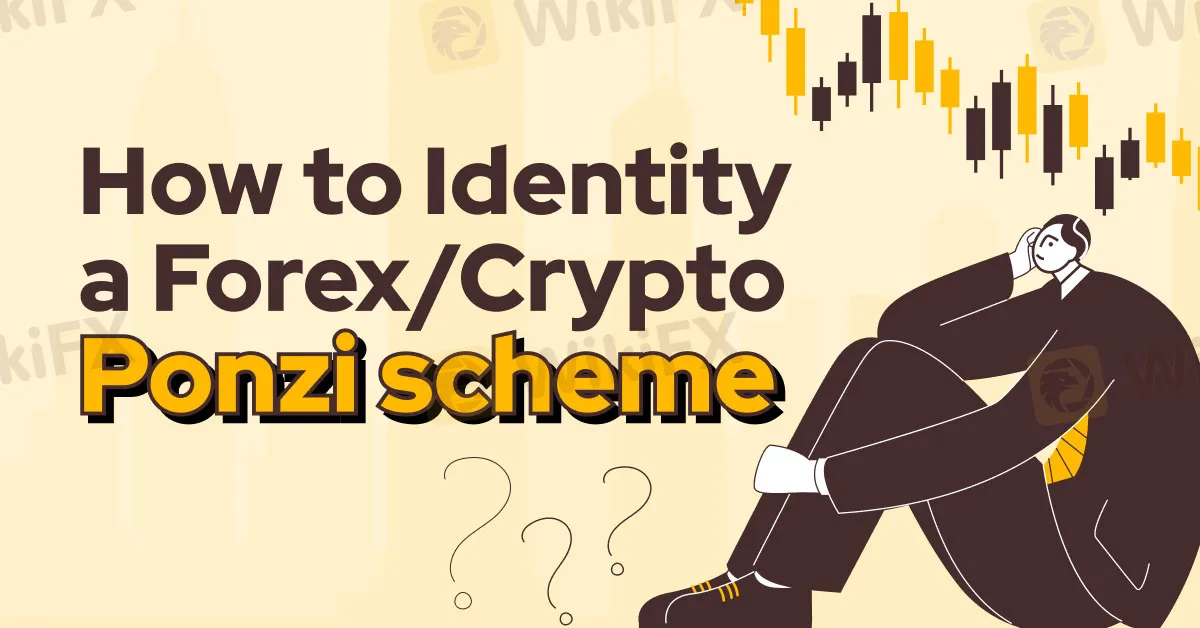简体中文
繁體中文
English
Pусский
日本語
ภาษาไทย
Tiếng Việt
Bahasa Indonesia
Español
हिन्दी
Filippiiniläinen
Français
Deutsch
Português
Türkçe
한국어
العربية
How to Identity a Forex/Crypto Ponzi Scheme
Abstract:Amid the vast opportunities of online trading, lurk hidden risks such as Ponzi schemes, deceptive practices promising high returns but often leading to financial ruin; as traders in the forex and cryptocurrency trading industry, it's imperative to remain vigilant and equipped with knowledge to identify and avoid such schemes.

In the dynamic world of online trading, where opportunities abound, there are unfortunately also risks lurking in the shadows. Among these risks are Ponzi schemes, deceptive practices that promise high returns but ultimately collapse under their own weight, leaving investors empty-handed. As traders in the forex and cryptocurrency trading industry, it is imperative to remain vigilant and equipped with the knowledge to identify and avoid such schemes.
First and foremost, one of the hallmark signs of a Ponzi scheme is the promise of unrealistically high returns on investment. These schemes often lure in unsuspecting investors with the allure of quick and guaranteed profits, far beyond what is realistically achievable in the market. As seasoned traders, it is crucial to approach any investment opportunity with a healthy dose of scepticism and to scrutinize claims of extraordinary returns with caution.

Another red flag to watch out for is a lack of transparency and accountability from the individuals or entities behind the investment scheme. Ponzi operators often operate in the shadows, avoiding scrutiny and providing vague or evasive answers to inquiries about their operations. Legitimate trading platforms and investment opportunities should be transparent about their business practices, regulatory compliance, and the individuals involved in managing the funds.
Additionally, Ponzi schemes typically rely on a constant influx of new investor funds to pay out returns to existing investors. This unsustainable model can often be identified by promises of referral bonuses or incentives for recruiting new investors. As traders in this industry, it is essential to recognize that legitimate investment opportunities do not rely on recruiting new investors to sustain returns.
Furthermore, Ponzi schemes may also lack proper regulatory oversight or licensing, operating in the shadows to avoid scrutiny from financial authorities. As responsible traders, it is crucial to conduct due diligence on any trading platform or investment opportunity, ensuring that it is registered with the appropriate regulatory bodies and adheres to industry best practices. To do this efficiently, download the free WikiFX mobile application or visit www.wikifx.com. WikiFX is a global forex regulatory query platform that stores verified information on over 50,000 brokers worldwide.

In conclusion, it is incumbent upon online traders to remain vigilant and informed about the risks posed by Ponzi schemes and other fraudulent practices. By staying educated, exercising caution, and conducting thorough due diligence, we can protect ourselves and our investments from falling victim to these deceptive schemes. Remember, if an investment opportunity sounds too good to be true, it probably is.

Disclaimer:
The views in this article only represent the author's personal views, and do not constitute investment advice on this platform. This platform does not guarantee the accuracy, completeness and timeliness of the information in the article, and will not be liable for any loss caused by the use of or reliance on the information in the article.
Read more

Justice Served: Illegal Investment Scheme Ends in RM28 Million Repayment
The Kuala Lumpur High Court has ruled that a Singaporean businessman, Chan Cheh Shin, must return RM28 million to 122 Malaysian investors after the court determined that his investment operations were conducted illegally.

RM900,000 Scammed: The Hidden Dangers of Online Investment Schemes
A 53-year-old factory manager from Malaysia has fallen victim to an online investment scam, losing over RM900,000 of her savings. This case underscores the growing threat of online scams preying on unsuspecting individuals.

Tokyo Police Arrest 4 for Unregistered FX Trading Scheme
Four men in Tokyo were arrested for running an unregistered FX trading operation, collecting over ¥1.6 billion from 1,500 investors.

Doo Group Expands Its Operations with CySEC License
Doo Financial, part of Doo Group, receives a CySEC license, allowing FX/CFD services in Europe. This strengthens its global presence and regulatory standards.
WikiFX Broker
Latest News
BSP Shuts Down Uno Forex Over Serious AML Violations
ACY Securities Expands Global Footprint with South Africa Acquisition
Why Even the Highly Educated Fall Victim to Investment Scams?
Warning Against Globalmarketsbull & Cryptclubmarket
Rupee gains against Euro
Tokyo Police Arrest 4 for Unregistered FX Trading Scheme
Axi Bids AUD 52M to Acquire Low-Cost Broker SelfWealth, Outbidding Competitor Bell Financial
Crypto Influencer's Body Found Months After Kidnapping
US Regulators Tighten Oversight on Bank Anti-Money Laundering Efforts
Doo Group Expands Its Operations with CySEC License
Currency Calculator


